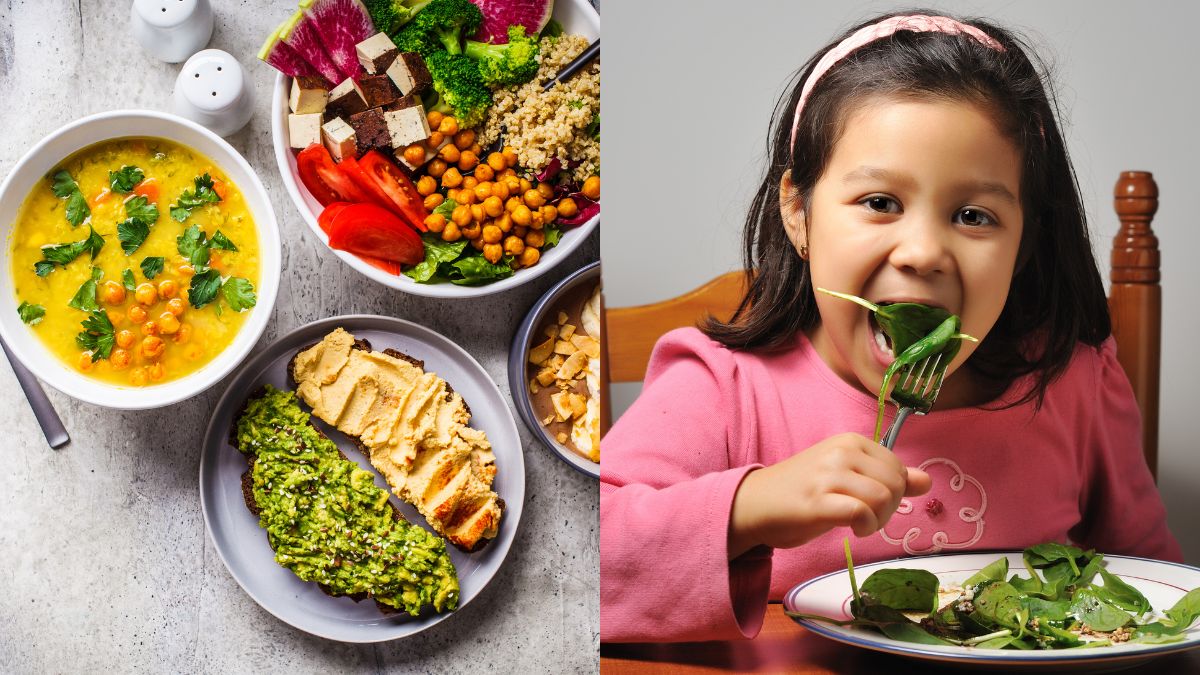In the span of just ten years, there has been a notable increase in the number of vegans in India. This upward trend is predominantly attributed to the younger demographic, with more than half of all vegans falling between the ages of 15 and 34. A significant portion of these individuals are choosing to raise their offspring in a similar manner. As an increasing number of families embrace plant-based lifestyles for their children, the concept of vegan parenting transcends mere dietary choices to encompass a commitment to consciousness across various domains.
Reasons Behind the Adoption of Vegan Parenting
 Picture credit- Canva
Picture credit- Canva
The decision to practice vegan parenting stems from a multitude of factors, ranging from ethical considerations to concerns regarding health and the environment. Kunal Mutha, the founder of the vegan food brand Only Earth, emphasizes that “ethical and environmental considerations are the driving forces behind vegan parenting.” He elaborates, stating that families are becoming more cognizant of the environmental repercussions of conventional animal agriculture and the ethical dilemmas associated with animal exploitation. Opting for plant-based diets allows families to align their values with their dietary preferences, fostering a sustainable and compassionate way of life.
With the increasing accessibility of information regarding the consequences of dietary choices, families are making more informed decisions about their food consumption habits. Mutha notes that families transitioning to vegan lifestyles often integrate zero-waste practices into their daily routines. This holistic approach extends beyond mere dietary preferences to encompass minimizing environmental impact across all facets of life. Parents engage in open dialogues with their children, educating them about the implications of their choices on animals and the environment.
The surge in individuals adopting plant-based diets for health reasons has led to a heightened demand for vegan food products. Vegan options are now more common in mainstream stores, which makes these goods easier for more people to get. Mutha highlights that supermarkets and restaurants now offer an extensive array of plant-based products, ranging from alternative milk to meat substitutes, facilitating parents in providing nutritious and enticing meals for their children.
Further reading: Ayodhya To Get World’s First Seven-Star, Vegetarian-Only Hotel; Details Inside
Addressing Nutritional Needs
 Photo Credits: Canva
Photo Credits: Canva
While parents may embrace a vegan lifestyle for personal health benefits, concerns often arise regarding whether a plant-based diet can fulfill all the nutritional requirements of growing children. Mutha dispels common misconceptions by affirming that “a well-planned and balanced vegan diet can adequately supply all the essential nutrients for a child’s growth and development.” To make a complete vegan meal plan for kids, you need to include a lot of different fruits, veggies, plant-based proteins, and foods that are high in calcium and vitamin D. The availability of a variety of plant-based food options, from alternative milk to meat substitutes, ensures that meals are both nutritious and appealing for vegan children.
Balancing a child’s desire to conform to societal norms while adhering to a vegan lifestyle can present challenges. Mutha offers the following alternatives:
- Calcium can be sourced from fortified plant-based milk alternatives, calcium-set tofu, dark leafy greens, and almonds.
- Concerns about a child’s protein intake can be eased by giving them a range of plant-based foods, like nuts, chickpeas, lentils, and tofu.
- Vitamin D can be obtained through safe sun exposure, fortified plant-based milk alternatives, or supplements.
These dietary choices provide ample protein for growth and development, debunking the misconception that vegan diets lack this essential nutrient.
Cultivating a Holistic Lifestyle from a Young Age
 Picture credit- Canva
Picture credit- Canva
Children raised in vegan households often opt to continue this lifestyle into adulthood, driven by a strong sense of ethical values and a commitment to fostering a sustainable future. Mutha emphasizes that vegan parenting is deeply rooted in historical practices, debunking the notion that veganism is merely a passing trend and highlighting its long-standing nutritional viability for families. Education plays a pivotal role in successful vegan parenting.
One of the primary objectives of vegan parenting is to instill empathy and compassion in children from a young age. Educating children about the nutritional benefits of plant-based foods and the broader impact of their choices on health and the environment empowers them to make informed dietary and lifestyle decisions. Vegan families actively involve their children in ethical decision-making processes, nurturing a sense of responsibility and critical thinking. Engaging children in meal preparation cultivates a connection with their food, while also fostering creativity in the kitchen.
In contemporary times, vegan parenting transcends mere dietary preferences to symbolize a broader cultural shift towards conscientious and sustainable consumption practices.

